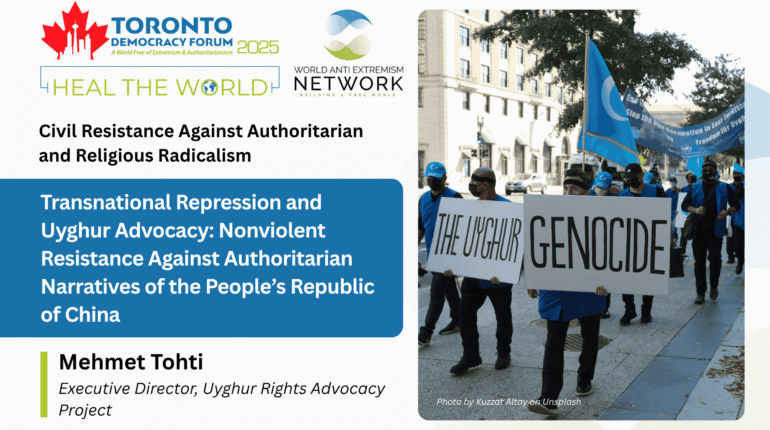
Transnational repression against the Uyghur community has become one of the most alarming manifestations of authoritarian influence beyond borders. The People’s Republic of China (PRC) extends its control through surveillance, intimidation, and coercion to silence Uyghur advocacy abroad, often framing it as extremism. This not only violates individual freedoms but also undermines democratic norms and civic space within host countries. In this excerpt, Mehmet Tohti discusses the far-reaching implications of this repression and the crucial role of the Uyghur Rights Advocacy Project (URAP) in leading nonviolent resistance against it. The paper also outlines key policy recommendations for democratic governments, such as Canada, to strengthen protections against foreign interference, empower civil society, and enhance institutional collaboration.
This paper offers a compelling insight on how civic resistance, when grounded in truth and resilience, can counter authoritarian repression and safeguard democracy beyond borders.
About the authors

Mehmet Tohti is a prominent Uyghur-Canadian activist and co-founder of the World Uyghur Congress, serving twice as its vice-president. As Executive Director of the Uyghur Rights Advocacy Project (URAP), he has led national efforts to secure protection and justice for Uyghurs persecuted by the Chinese state. Tohti played a key role in lobbying for Motion M-62, which calls on Canada to resettle 10,000 Uyghurs and other Turkic Muslims at risk of refoulement. He has testified before Parliament, mobilized civil-society partners, and urged Canadian governments and businesses to cut ties with supply chains tainted by Uyghur forced labour. Beyond humanitarian advocacy, Tohti has been a leading voice exposing transnational repression and foreign interference by Beijing targeting Uyghur communities in Canada. Despite repeated threats and harassment, he continues to campaign for stronger protections for diaspora activists. In December 2024, China sanctioned him under its Anti-Foreign-Sanctions Law for “interfering in China’s internal affairs,” a move widely viewed as retaliation for his successful lobbying efforts.

